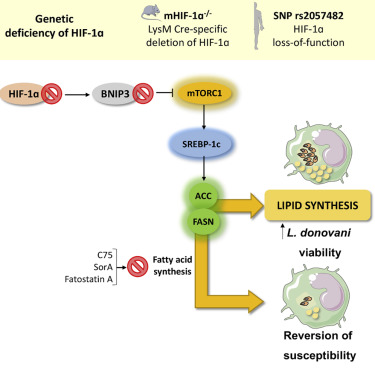Cell Reports ( IF 7.5 ) Pub Date : 2020-03-24 , DOI: 10.1016/j.celrep.2020.02.098 Inês Mesquita , Carolina Ferreira , Diana Moreira , George Eduardo Gabriel Kluck , Ana Margarida Barbosa , Egídio Torrado , Ricardo Jorge Dinis-Oliveira , Luís Gafeira Gonçalves , Charles-Joly Beauparlant , Arnaud Droit , Luciana Berod , Tim Sparwasser , Neelam Bodhale , Bhaskar Saha , Fernando Rodrigues , Cristina Cunha , Agostinho Carvalho , António Gil Castro , Jérôme Estaquier , Ricardo Silvestre

|
Hypoxia-inducible factor-1 alpha (HIF-1α) is considered a global regulator of cellular metabolism and innate immune cell functions. Intracellular pathogens such as Leishmania have been reported to manipulate host cell metabolism. Herein, we demonstrate that myeloid cells from myeloid-restricted HIF-1α-deficient mice and individuals with loss-of-function HIF1A gene polymorphisms are more susceptible to L. donovani infection through increased lipogenesis. Absence of HIF-1α leads to a defect in BNIP3 expression, resulting in the activation of mTOR and nuclear translocation of SREBP-1c. We observed the induction of lipogenic gene transcripts, such as FASN, and lipid accumulation in infected HIF-1α−/− macrophages. L. donovani-infected HIF-1α-deficient mice develop hypertriglyceridemia and lipid accumulation in splenic and hepatic myeloid cells. Most importantly, our data demonstrate that manipulating FASN or SREBP-1c using pharmacological inhibitors significantly reduced parasite burden. As such, genetic deficiency of HIF-1α is associated with increased lipid accumulation, which results in impaired host-protective anti-leishmanial functions of myeloid cells.
中文翻译:

HIF-1α的缺乏通过激活BNIP3 / mTOR / SREBP-1c轴增加了对多发利什曼原虫感染的易感性
缺氧诱导因子-1α(HIF-1α)被认为是细胞代谢和先天免疫细胞功能的全局调节剂。据报道,诸如利什曼原虫的细胞内病原体可操纵宿主细胞的代谢。在本文中,我们表明,从骨髓性限制的HIF-1α缺陷型小鼠,并与失功能个体骨髓细胞HIF1A基因多态性更容易受到杜氏利什曼原虫通过增加脂肪生成感染。HIF-1α的缺乏会导致BNIP3表达的缺陷,从而导致mTOR的激活和SREBP-1c的核易位。我们观察到了脂肪形成基因转录本(如FASN)的诱导,以及在感染的HIF-1α -/-巨噬细胞中脂质的积累。多诺尼感染HIF-1α缺陷的小鼠在脾和肝髓样细胞中发生高甘油三酸酯血症和脂质蓄积。最重要的是,我们的数据表明使用药理抑制剂操作FASN或SREBP-1c可以显着降低寄生虫负担。因此,HIF-1α的遗传缺陷与脂质积累增加有关,这导致髓样细胞的宿主保护性抗利什曼原虫功能受损。











































 京公网安备 11010802027423号
京公网安备 11010802027423号